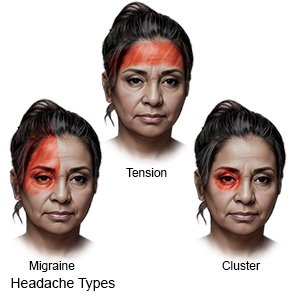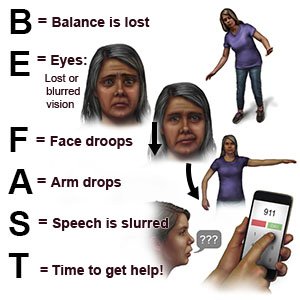General Headache
Medically reviewed by Drugs.com. Last updated on Apr 6, 2025.
Headache pain may be mild or severe. Common causes include stress, medicines, and head injuries. Sleep problems, allergies, and hormone changes can also cause a headache. You may have frequent headaches that have no clear cause. Pain may start in another part of your body and move to your head. Headache pain can also move to other parts of your body. A headache can cause other symptoms, such as nausea and vomiting. A severe headache may be a sign of a stroke or other serious problem that needs immediate treatment.
 |
DISCHARGE INSTRUCTIONS:
Have someone call your local emergency number (911 in the US) for any of the following:
- You have any of the following signs of a stroke:
- Numbness or drooping on one side of your face
- Weakness in an arm or leg
- Confusion or difficulty speaking
- Dizziness, a severe headache, or vision loss

Return to the emergency department if:
- You have a headache with neck stiffness and a fever.
- You have a constant headache and are vomiting.
- You have severe pain that does not get better after you take pain medicine.
- You have a headache and the pain worsens when you look into light.
- You have a headache and vision changes, such as blurred vision.
- You have a headache and are forgetful or confused.
Call your doctor if:
- You have a headache each day that does not get better, even after treatment.
- You have changes in your headaches, or new symptoms that occur when you have a headache.
- Others you live or work with also have headaches.
- You have questions or concerns about your condition or care.
Medicines:
You may need any of the following:
- Medicines may be given to prevent or treat headache pain. Do not wait until the pain is severe to take your medicine. Ask your healthcare provider how to take the medicine safely.
- NSAIDs , such as ibuprofen, help decrease swelling, pain, and fever. This medicine is available with or without a doctor's order. NSAIDs can cause stomach bleeding or kidney problems in certain people. If you take blood thinner medicine, always ask if NSAIDs are safe for you. Always read the medicine label and follow directions. Do not give these medicines to children younger than 6 months without direction from a healthcare provider.
- Acetaminophen decreases pain and fever. It is available without a doctor's order. Ask how much to take and how often to take it. Follow directions. Read the labels of all other medicines you are using to see if they also contain acetaminophen, or ask your doctor or pharmacist. Acetaminophen can cause liver damage if not taken correctly.
- Antinausea medicine may be given to calm your stomach and help prevent vomiting.
- Take your medicine as directed. Contact your healthcare provider if you think your medicine is not helping or if you have side effects. Tell your provider if you are allergic to any medicine. Keep a list of the medicines, vitamins, and herbs you take. Include the amounts, and when and why you take them. Bring the list or the pill bottles to follow-up visits. Carry your medicine list with you in case of an emergency.
Manage your symptoms:
- Rest in a dark and quiet room. This may help decrease your pain.
- Apply heat or ice as directed. Heat or ice may help decrease pain or muscle spasms. Apply heat or ice on the area for 20 minutes every 2 hours for as many days as directed. Your healthcare provider may recommend that you alternate heat and ice.
- Relax your muscles to help relieve a headache. Lie down in a comfortable position and close your eyes. Relax your muscles slowly. Start at your toes and work your way up your body. A massage or warm bath may also help relax your muscles.
Keep a headache record:
Record the dates and times that you get headaches, and what you were doing before the headache started. Also record what you ate and drank in the 24 hours before the headache started. This might help your healthcare provider find the cause of your headaches and make a treatment plan. The record can also help you avoid headache triggers or manage your symptoms.
Get enough sleep:
You should get 8 to 10 hours of sleep each night. Create a sleep schedule. Go to bed and wake up at the same times each day. It may be helpful to do something relaxing before bed. Do not watch television right before bed.
Do not smoke:
Nicotine and other chemicals in cigarettes and cigars can trigger a headache or make it worse. Ask your healthcare provider for information if you currently smoke and need help to quit. E-cigarettes or smokeless tobacco still contain nicotine. Talk to your healthcare provider before you use these products.
Drink liquids as directed:
You may need to drink more liquid to prevent dehydration. Dehydration can cause a headache. Ask your healthcare provider how much liquid to drink each day and which liquids are best for you.
Limit caffeine and alcohol as directed:
Your headaches may be triggered by caffeine or alcohol. You may also develop a headache if you drink caffeine regularly and suddenly stop.
Eat a variety of healthy foods:
Do not skip meals. Too little food can trigger a headache. Include fruits, vegetables, whole-grain breads, low-fat dairy products, beans, lean meat, and fish. Do not have trigger foods, such as chocolate and red wine. Foods that contain gluten, nitrates, MSG, or artificial sweeteners may also trigger a headache.
 |
Follow up with your doctor as directed:
Write down your questions so you remember to ask them during your visits.
© Copyright Merative 2025 Information is for End User's use only and may not be sold, redistributed or otherwise used for commercial purposes.
The above information is an educational aid only. It is not intended as medical advice for individual conditions or treatments. Talk to your doctor, nurse or pharmacist before following any medical regimen to see if it is safe and effective for you.
Further information
Always consult your healthcare provider to ensure the information displayed on this page applies to your personal circumstances.
